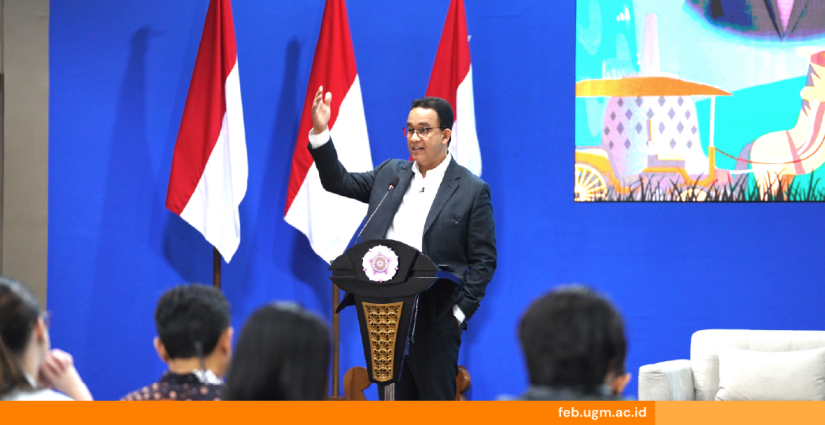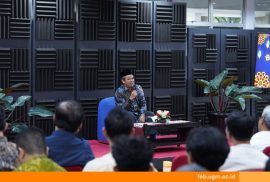
Governor of DKI Jakarta for the 2017-2022 period, who is also an alumnus of FEB UGM, Anies Rasyid Baswedan, Ph.D., returned to the FEB UGM campus to deliver an inspirational lecture on narrative leadership to realize a sustainable future in a series of Global Summer Week 2025. The activity occurred on Monday, July 14, 2025, and was attended by 57 students from 9 universities from 8 countries.
Anies said narrative-based leadership can unify vision, build trust, and mobilize collective action. This leadership model is essential to implement, especially amid the climate crisis, social inequality, and declining public trust.
“This is not just a time of change, it is a time that demands leadership with clarity, courage, and direction,” he said on Monday (14/07) in the Auditorium of the Faculty’s Learning Center.
He explained that narrative leadership would help people see the big picture and their role. It is about offering a vision of the future that feels possible, meaningful, and worth fighting for.
“Because people don’t just follow strategies. They follow stories, and without a story of where we’re going, no one will walk with us,” he explained.
He explained why narrative-based leadership is essential in sustainability issues. He says sustainability is not simply framed through numbers and technical policies. A meaningful narrative can transform sustainability from an obligation to a shared mission. Through real examples when leading Jakarta, he applied a narrative approach in various public policies, ranging from transportation integration, sidewalk revitalization, to the redevelopment of the Aquarium Flat Village.
“Every one of these policies was accompanied by a narrative, not for publicity, but for a purpose. When we launched a new sidewalk, we didn’t just cut a ribbon. We spoke about inclusion, about reclaiming the commons, about what it means to feel visible in your own city. Narrative wasn’t the packaging; it was the soul of the policy,” he said
So, how does this narrative-based leadership work in reality? Anies explained that narrative leadership is not about charisma or telling stories full of emotion for the sake of applause. Narrative leadership is a way of leading with intention, structure, and deep purpose.
“At the heart of narrative leadership are three main pillars of clarity, consistency, and co-creation,” he said.
Anies said that narrative leadership is not just a theory but has been practiced by several leaders. They are political figures and business leaders who understand that meaning is the driver of the movement, showing how storytelling can shape strategy, restore trust, and unlock collective action. One of them is Barack Obama, who in 2008 came to the world stage not just with policies, but with stories. His narrative allowed the excluded, such as young people, immigrants, and the working class, to feel part of the nation’s journey.e, not for publicity, but for a purpose. We didn’t just cut the ribbon when we launched the new sidewalk. We talked about inclusion, reclaiming shared space, and what it means to be visible in one’s city. Narrative is not packaging, it is the soul of the policy itself,” he explains.
He further said narrative leadership is not just delivering messages from above, but building a shared movement. A leader not only voices the story but also creates a space for others to write, translate, and expand it according to their context. This approach is applied in the Jakarta government through the concept of Kota 4.0, where citizens are encouraged to co-design, report problems, and implement solutions together.
“Narrative also helps us move from ego-system to ecosystem, from isolated efforts to interdependent collaboration,” he added.
He mentioned that this century’s significant challenges, such as the climate crisis, inequality, and polarization, demand patience, resilience, and a strong narrative to maintain the collective spirit. Narratives are vital as a bridge that fosters trust, drives change, and unites values with real action, whether in business, government, or community.
“People follow leaders whose narratives align with their expectations, and whose actions align with their words. Consistency breeds credibility. Credibility breeds trust. And trust breeds movement,” he explained.
Report by: Kurnia Ekaptiningrum
Sustainable Development Goals












